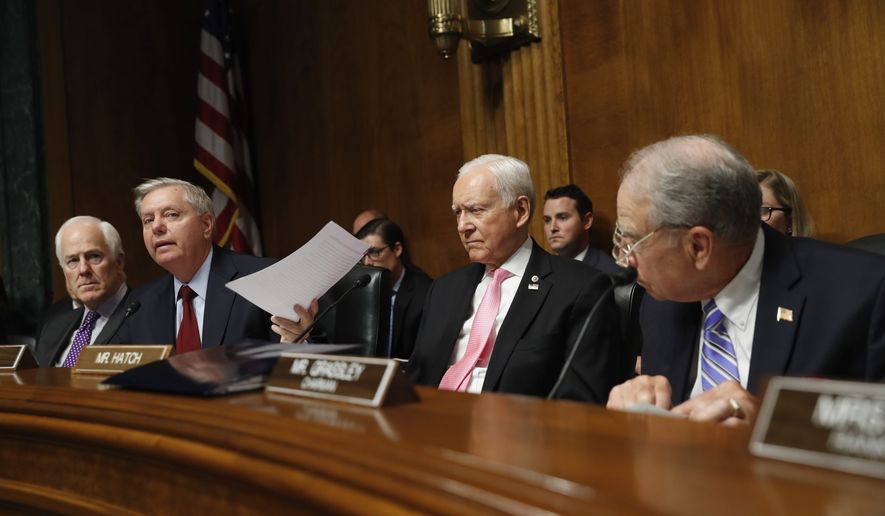Congressional investigators have hit roadblocks this week as they’ve tried to get the Justice Department to turn over information on Russian interference in the 2016 election and on the firing of former FBI Director James B. Comey.
The Justice Department told the Senate Judiciary Committee it won’t allow congressional investigators to interview two FBI officials about Mr. Comey’s dismissal, saying the request conflicts with the ongoing special counsel’s probe.
And two Republican senators also hadn’t received records they requested from the FBI regarding Mr. Comey’s decision not to recommend charges against former Secretary of State Hillary Clinton last year. They’d set a Wednesday deadline.
“I can’t say why they are not turning them over, just that they haven’t given us the information we’ve requested, nor have they provided a timeline for when we can expect that,” said Taylor Foy, a spokesman for Sen. Chuck Grassley. “We are going to keep pushing for them.”
Mr. Grassley and Sen. Lindsey Graham requested the records as part of an investigation into Mr. Comey’s firing. They said partial interview transcripts they’ve reviewed suggest Mr. Comey drafted an exoneration of Mrs. Clinton for her email practices as earlier as April 2016 — well before she was interviewed on July 2. Three days after that interview, Mr. Comey said he wasn’t recommending charges.
Three congressional committees are looking into potential Russian interference with the election, creating potential conflicts with Special Counsel Robert Mueller, who was appointed to pursue a criminal probe.
Congressional investigators have been able to interview some key officials and obtain documents in their investigations.
But the Justice Department has firmly told the judiciary committee it has no intention of making Carl Ghattas, the head of the FBI’s national security division, and James Rybicki, Mr. Comey’s former chief of staff, available to talk about Mr. Comey’s dismissal.
“As a threshold matter, the scope of the Committee’s inquiry has not been de-conflicted with Special Counsel Mueller’s investigation,” Assistant Attorney General Stephen Boyd wrote in a response to the request. “Therefore, in order to protect the integrity of the Special Counsel’s investigation, as we have previously indicated, we will not be able to provide Mr. Ghattas or Mr. Rybicki for interviews at this time.”
Justice Department spokeswoman Sarah Isgur Flores declined to comment on the response, referring questions to the Office of the Special Counsel. But she said that, in general, Justice Department officials “are cooperating fully” with congressional investigators.
A spokesman for Mr. Mueller’s team declined to comment.
Andrew Frey, a former deputy solicitor general who testified before Congress this year about the history of parallel congressional and special counsel investigations, said he can understand the Justice Department trying to protect that probe by refusing some requests.
“Talking to FBI agents about the investigation is different than people who were involved in the activities, and I can understand why the department wants to keep its internal investigations confidential even from a congressional committee,” he said.
The Justice Department is still negotiating a response to at least one other request from a congressional committee with a deadline this week.
House intelligence committee Chairman Rep. Devin Nunes has threatened to drag the attorney general and new FBI director before his panel unless they turn over documents by Thursday that were related to a salacious dossier of Mr. Trump’s supposed activities in Russia.
“Conversations with the committee are ongoing, and the subpoenas that had compliance dates for tomorrow are on hold during that process,” said Ms. Flores, the Justice Department spokeswoman.
A spokesman for Mr. Nunes declined to comment.
On Wednesday the White House intensified its attack on Mr. Comey, saying the former director broke federal law by writing and then leaking memos detailing conversations with the president in which, he said, he felt Mr. Trump tried to pressure him to end the FBI’s probe into Russian election meddling.
“The memos that Comey leaked were created on an FBI computer while he was the director. He claims they were private property, but they clearly followed the protocol of an official FBI document,” White House press secretary Sarah Sanders said. “Leaking FBI memos on a sensitive case, regardless of classification, violates federal laws including the Privacy Act, Standard FBI Employment Agreement and nondisclosure agreement all personnel must sign.”
Justice Department blocks 2 witnesses in Comey case
• Dan Boylan contributed to this report.
• Andrea Noble can be reached at anoble@washingtontimes.com.




Please read our comment policy before commenting.